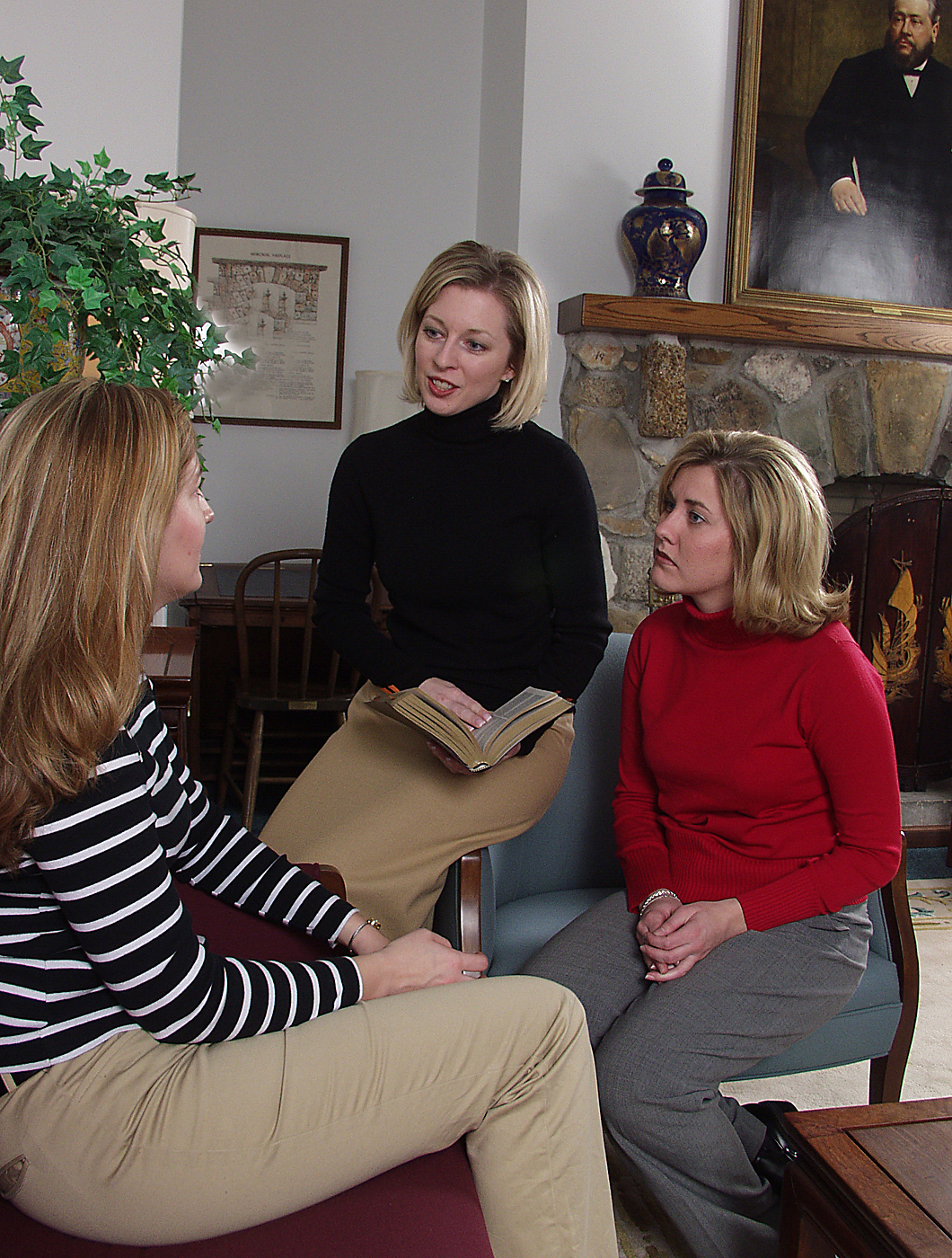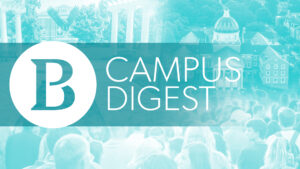
IRVING, Texas (BP)–For Baptist women excluded from the senior pastorate, why spend time and energy training for ministry in the local church at a Southern Baptist seminary? This question is being addressed by all six seminaries supported by the Southern Baptist Convention’s Cooperative Program.
The Baptist Faith & Message 2000’s article on the church gave critics a chance to contend that Southern Baptists believe women do not play an important role in the church, said Heather King, one of two females that served on the study committee to revise the historic confessional statement.
“In authoring the statement on women serving in the local church, the committee fully realized that both Scripture and the testimony of Jesus designates women as integral ministry initiators and coworkers,” said King, women’s program coordinator at Southern Baptist Theological Seminary in Louisville, Ky. “That is why it is so important for women to be present in seminary classrooms, so they can be equipped for ministry.”
Critics of the confessional statement expected female attendance in Southern Baptist seminaries to drop in the post-convention meeting media blitz that labeled the SBC as misogynist. However, statistics from all six schools indicate female enrollment has remained the same or is growing. For example, in 1991 Southeastern Baptist Theological Seminary reported 85 female students on its main campus. In 2002, the number jumped to 506, a 495 percent increase in total female student population at the Wake Forest, N.C., campus.
The irony of this situation is not lost on Terri Stovall, women’s program director for Southwestern as female enrollment at the Fort Worth, Texas, campus has remained steady, up from 670 females enrolled last spring.
“I have seen local churches opening the doors to women for all types of ministry opportunities. The BF&M 2000 affirms and empowers women to discover the gifts, talents and passion that God has given them and then seek out where best to use those gifts in the local church,” said Stovall, who also serves as assistant professor of adult education and aging in Southwestern’s school of educational ministries. “I know of women and have friends who serve as church administrators, worship music leaders, educational ministers, student ministers, children and preschool ministers and yes … even women’s ministers.”
SOUTHWESTERN SEMINARY
In the fall of 2002, 692 women were enrolled in classes on Southwestern’s main campus, 178 of whom were pursuing the master of arts in Christian education degree. This degree, which offers a concentration in women’s ministry, consists of 70 hours and has been in place at the seminary since 2000. The degree includes 14 hours of seminary core classes, 12 hours of theology classes and 32 hours of courses within the school of educational ministries. The concentration in women’s ministry includes courses such as women’s issues, adult development psychology, counseling with Scripture, and speech and oral interpretation.
Stovall, who helped design the curriculum, stated that the degree equips women to fulfill “a myriad of leadership roles” as a lay leader, church staff member, denominational employee or missionary.
“My vision is that the women’s ministry program at SWBTS equips women to make a difference for the Kingdom of God in whatever context they are placed,” Stovall said. “My dream is to begin to take this training to other states and even other countries. A number of my students are international women who want to impact the families from their home country and often the best way to do that is woman to woman.”
The seminary also offers a certificate program to train women currently ministering in the local church but unable to attend classes fulltime. SWBTS also seeks to equip the wives of students to be partners in ministry with their husbands. This year, the Texas seminary established a leadership certificate in women’s ministry with new courses being added each year in the area of women’s ministry, teaching and counseling for women.
SOUTHERN SEMINARY
Southern Seminary also is creating new programs for women. In 2002, the seminary hired King as its first fulltime women’s program director.
“The growing trend is toward large churches hiring both part-time and fulltime women’s directors. Even more important, the next five to seven years will be pivotal in Southern Baptist life as many state convention women’s directors are nearing retirement,” King said. “As women answer God’s call to serve and seek out specific programs to equip them for ministry, the pool of seminary-educated women grows. This not only benefits the local church, but the denomination as a whole.”
King also is working to implement 15 hours of academic courses to prepare women for ministry in the local church and church agencies. The women’s ministry courses are a part of the master of arts in Christian education degree or the master of divinity degree, allowing fulltime students to receive “specialized preparation for woman-to-woman ministry.” Theology, communication and leadership skills, missions and evangelism, and the practical application of ministry skills are all emphasized in the program.
Another new development on the seminary’s collegiate level is the introduction of a Women’s Ministry Institute that will equip women unable to enroll as fulltime students. Because courses will be held in three- to five-day workshops, King said the institute will benefit women who are currently ministering in their churches but want supplemental training. In 2001-02, women outnumbered male students enrolled in Boyce College, 51 to 49 percent. Women enrolled in Boyce College also outnumbered other women enrolled in graduate degree tracks in the seminary such as theology, music, church ministry and missions and evangelism.
Additionally, the Seminary Wives Institute at Southern continues to strengthen its ministry to the wives of seminary students. SWI is designed to give ministers’ wives biblically based and practically applied teaching, King said, adding that this ministry is the “heartbeat” of Mary Mohler, the wife of Al Mohler, SBTS president. Faculty wives are utilized to teach and mentor women to serve alongside their husbands.
In addition to SBTS’ coursework for women, the seminary also employs the use of professors known in the evangelical world for work in the area of biblical manhood and womanhood, such as Thomas Schreiner, professor of New Testament and author of the book, “Two Views on Women in Ministry.”
“For a woman to sit under professors of this caliber and be challenged to think systematically and thoroughly concerning all issues of womanhood is transformational to her life and ministry,” King said.
SOUTHEASTERN SEMINARY
Also known throughout the evangelical arena and the SBC as an expert on biblical womanhood is Dorothy Patterson, the wife of Southeastern Baptist Theological Seminary President Paige Patterson. The recipient of two doctorates and general editor of the Women’s Study Bible, Patterson has impacted coursework at SEBTS with her vision to educate women theologically. In 1998, she introduced to the convention the first accredited program for women in the master of divinity with women’s studies degree.
While other SBC schools offer women’s programs within the school of education and as certificate programs, this 96-hour degree emphasizes theology and the classical languages as the underlying methodology for implementing women’s ministry in the local church.
Because Patterson believes the role of women and women’s ministry is derived from the Bible, all training programs should be biblically based. “We think so often that teaching the Bible is like motherhood — you don’t need training or preparation, you just fall into it. It’s ridiculous to think you can do your very best in teaching God’s Word if you’ve never had any training,” Patterson said, noting that many “untrained” laypeople are capable of teaching the Scripture due to personal study. “But we have got to have some women who pay the price to train the vast numbers of lay teachers we have.”
Southeastern’s website states the concentration in women’s studies prepares women for Christian leadership positions such as “church staff and denominational positions in which they develop, deliver and/or supervise ministries to women”; missionary and evangelistic work; women’s conference ministries; teaching to women the Bible and related disciplines; and advocacy work.
The degree is divided into 42 hours of core classes and 34 hours of women’s studies requirements that include courses such as biblical theology of womanhood, biblical interpretation for women and gender roles in the Bible. Another 10 hours is comprised of specialty electives in which students can choose from courses such as women in church history and feminist theology.
The seminary also offers a certificate in women’s studies for “non-degree seeking wives of seminary students … who are preparing for Christian service through local churches or in other ministry settings,” according to the website. The certificate totals 12 units while an advanced certificate is offered when students take eight credit hours of college or seminary coursework.
“At SEBTS, we are pushing the importance of every woman who has the opportunity to be on a seminary campus while [her husband] is doing his work, to take advantage of taking courses and preparing themselves, even if she is not planning to seek a paid position in a church or in the denomination,” Patterson said.
In an interview with the Southern Baptist Texan, Patterson recapped various reasons for developing a theologically driven ministry track for women at Southeastern, including the production of scholars to defend biblical prescriptions for the home and church.
“I think we’ve got to produce some scholars. They’ve got to be writing, they’ve got to be in classrooms. That’s one place where the feminists have had their victories,” she said, referring to the recent explosion of anti-evangelical books. “We’ve got to produce women as evangelicals who are going to write books and be equipped to debate.”
Patterson also aims to train women who are capable of teaching other women.
“Don’t sell short biblical studies,” said Patterson, who was the only female student in theology classes during her degree work at New Orleans Baptist Theological Seminary. “Everyone can’t be in the classroom, but we can produce a group of core leaders who can help women who are teaching and help them find the right courses and prepare them to teach other women.”
Primarily considering herself a “homemaker and helper” to her husband, Patterson believes theological education strengthens the relationship between a wife and husband and the role of a mother.
“We want to help our women to be a better helper to their minister husband. They [need] to be partners in ministry,” Patterson said, adding that because she is well-versed in theological discussions she is able to interact with her husband on a level that is beneficial for both of them. “He feels that it is a mutual helpfulness that we are able to have stimulating conversations.”
Patterson added that there will be growing needs for seminary-trained women in Southern Baptist life in the future. “I’m excited that we’ve got so many women interested in studying, and oh, how I pray that women will not only have a hunger to know what God says, but have an absolute hunger to do what God says. I want those women who come through my classes to catch that desire to study the Scripture and then to determine and wrestle with different issues and come to their positions and the reason for holding those positions from a biblical text.”
NEW ORLEANS SEMINARY
At New Orleans Baptist Theological Seminary, innovative teaching techniques are characteristic of the opportunities available to women seeking seminary training. As developed by Rhonda Kelley, wife of NOBTS President Chuck Kelley, many classes and workshops are available online.
In addition to distance learning, New Orleans Seminary offers seven different programs that prepare women to minister to other women in the local church setting. Three different certificates are offered: an eight-hour women’s ministry certificate; a 16-hour advanced women’s ministry certificate; and a new certificate in excellence geared toward ministers’ wives. Beyond certification in women’s ministries, NOBTS also offers an associate in women’s ministry that totals 69 hours with 18 hours in women’s ministry courses and 51 hours in general education work.
Undergraduate work at NOBTS offers the bachelor of arts in Christian ministry with a minor in women’s ministry totaling 126 hours, with two other choices are given for graduate work. The master of divinity with a specialization in Christian education/women’s ministry and a master of arts in Christian education with a specialization in women’s ministry degrees each require 12 hours of specialization work in addition to core requirements for graduate work.
Kelley said the options presented by NOBTS reflect an array of needs in ministry for women.
“Work among women has increased significantly in recent years, and pastors have recognized the importance of women in the church’s ministry; therefore, more churches have formalized programs for women and even have hired women to serve on staff as women’s ministry directors,” Kelley said. “Women are better able to meet the needs of other women, believers and unbelievers, and when reached the women often bring their husbands and children to church.”
Coursework at New Orleans Seminary emphasize courses that will give women hands-on knowledge of creating and implementing women’s ministry programs in the local church. These courses include contemporary models for women’s ministry; leadership training; public speaking; missions and evangelism; planning special events; recreational programs for women; support groups for women; and women’s work in the local church.
Although needs for women ministering in the church have served as the catalyst for an increase in leadership roles in the church, Kelley stated that NOBTS prepares women for ministry in all areas of church work with the exception of the role as pastor.
“It is our biblical conviction that men are to be the spiritual leaders in the home and church, and the position of senior pastor is one to be held by godly, called men,” Kelley said. “We have women training for ministry in education, counseling, missions and teaching. Many ladies serve in a lay capacity as women’s leaders and desire specialized training in women’s ministry alone. Other women feel a more general call to ministry and desire a broader degree. It is important for women to be called to minister to other women and also to pursue their further education.”
In 2001-02, NOBTS reported 355 female students enrolled on campus; this figure, however, does not reflect the number of women taking advantage of the seminary’s online course work.
MIDWESTERN SEMINARY
Midwestern Baptist Theological Seminary in Kansas City, Mo., also is actively equipping women to work in local church settings. The seminary’s website states that through its diploma wives studies program, a non-degree, student wives are given the opportunity to “enhance spiritual, practical and essential skills necessary for effective service as a ministering wife.” In 2001-02, the school reported 160 female students on its main campus, while 171 were enrolled in the ministering wives program. The previous academic year, the seminary experienced a peak year in enrollment for the non-degree program with 247 women enrolled in courses.
Students are required to take 11 hours of foundational core classes that include Baptist heritage and beliefs, marriage enrichment, and ministry and discipleship courses. Women also choose between Old and New Testament courses and other Bible study tracks.
An additional two hours of the diploma for the ministering wife is selected from WISDOM electives, an acronym for Wives in Seminary Developing Our Ministries. WISDOM classes include practical coursework specific to the future ministry area of the student such as missionary wife; ministry in the church; deaf interpretation; and various music workshops.
GOLDEN GATE SEMINARY
Although Golden Gate Baptist Theological Seminary in the San Francisco Bay area does not currently offer a specialized degree for women, it created a position for women’s ministry, with Helen Groat of San Anselmo, Calif., named women’s ministry coordinator in August 2002.
Groat is responsible for working closely with the women female students at the California seminary and becoming and an advocate for their needs. She also will implement campus-wide women’s ministries events and advise the campus’ existing women’s organization. As a Texan, Groat served seven years at Criswell College in Dallas as founder of a ladies auxiliary and adviser to the Student and Student Wives Fellowship. According to the SBC’s Cooperative Program allocation budget ministry reports for 2003-04, Golden Gate reported 143 women enrolled in classes during the 2001-02 school year on its main campus.
As evidenced through the number of degree-, certificate- and institute-type coursework available to women in Southern Baptist seminaries, Baptist women are increasingly turning to seminary education to better equip themselves for ministry, marriage or life in general.
“When I visit with new students one of the first things I tell them is ‘welcome to the next level.’ Most of the students have grown and matured in their faith, have answered God’s call to ministry and are serving Him daily,” SWBTS’ Terri Stovall said. “Seminary training offers women the opportunity to go to the next level. Seminary education is more than just attending classes and studying for exams. It is sitting under some of the greatest theologians and educators of our time. It is making relationships in ministry that will last a lifetime. It is preparing yourself to answer whatever call God gives you for tomorrow.”
–30–
Article courtesy of the Southern Baptist Texan newsjournal. (BP) photo posted in the BP Photo Library at https://www.bpnews.net. Photo title: ENCOURAGING WOMEN.














